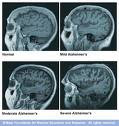 (HealthDay News) -- A new questionnaire may help in both diagnosing older adults facing dementia and also in identifying individuals who need help with daily living.
(HealthDay News) -- A new questionnaire may help in both diagnosing older adults facing dementia and also in identifying individuals who need help with daily living.The Everyday Cognition instrument consists of 39 questions to be answered by people who know the patient well.
"There have been a number of studies that show that people with mild cognitive impairment who have functional problems in addition to performing poorly on neuropsychological testing are more likely to progress in the near future," said study author Sarah Tomaszewski Farias, an assistant professor of neurology at the University of California, Davis, Medical Center in Sacramento. "One of our hopes is that this instrument will be able to help identify very early on those people at increased risk for developing Alzheimer's disease."
That would help both patients and family members prepare for what lies ahead and identify patients who need to be more closely monitored.
In addition, Farias said, the test would also help identify "people who are having [functional] problems so that we know who needs help and who doesn't."
"What's nice about this is that it is designed to pick up very early memory problems, and it's an entirely caregiver-based survey," said Dr. Scott Turner, incoming director of the Memory Disorders Program at Georgetown University Medical Center, in Washington, D.C. "This is something the caregiver can fill out, while the practitioner is looking at the patient. It could be used for screening, for diagnosis and for drug development, if you want to look for some proof that your drug is having some effect, so it has a lot of potential uses."
"They want something that they could use to ask a family member about the potential patient's everyday functioning to see if that's sensitive to picking up the likelihood of dementia early on," added Dr. Gary J. Kennedy, director of geriatric psychiatry at Montefiore Medical Center in New York City.
The findings were published in the July issue of Neuropsychology.
Existing neuropsychological tests tend to be very abstract. For the last 40 years, these tests have looked at two categories: so-called "basic" activities (such as grooming, feeding, dressing), which are affected in later stages of dementia, and "instrumental" activities of daily living (such as managing medication, finances, cooking, driving).
"I was interested in understanding how our neuropsychology tests translated into everyday problems, how our cognitive tests . . . translate into everyday problems that a person is experiencing and that a caregiver is concerned about," Farias explained.
Farias and her colleagues divided everyday functioning into seven cognitive "domains:" memory, language, semantic or factual knowledge, visual and spatial abilities, planning, organization and divided attention.
An original list of 138 items was eventually culled to 39, which was then tested in 576 older adults: 174 of whom were cognitively normal, 126 who had mild cognitive impairment (MCI), and 276 who had been diagnosed with dementia.
"Informants" (people who had known the patient for an average of almost 45 years) provided details on whether the patient could remember shopping items without a list, reading a map, balancing the checkbook, and cooking or working and talking at the same time.
Not only did the instrument confirm established diagnoses, it was also able to distinguish people with MCI from those with full-blown dementia, meaning it was able to pick up on subtle differences in function.
The results also weren't highly influenced by occupation and education levels, as are existing tests.
"This is really the first step in development the instrument," Farias said. "What we're really interested in doing is to track people over time to get a better understanding of the early signs of functional impairment."
More information
Visit the Alzheimer's Association for more on this condition.



No comments:
Post a Comment